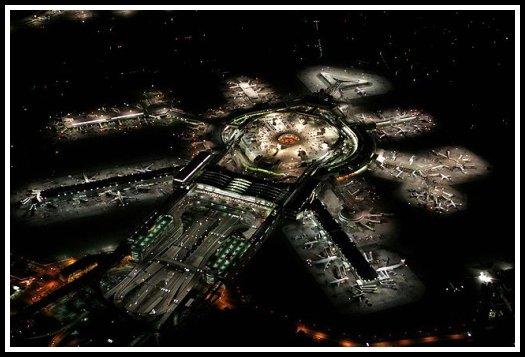Airport definition and business activities
There is no other airport in the world which serves so many people and
so many airplanes. This is an extraordinary airport ... it could be
classed as one of the wonders of the modern world.
- John F. Kennedy, dedicating the Chicago O'Hare airport.

An aerial view of a San Francisco International Airport at night
An airport is a location where aircraft such as fixed-wing aircraft, helicopters, and blimps take off and land. Aircraft may be stored or maintained at an airport. An airport consists of at least one surface such as a runway for a plane to take off and land, a helipad, or water for takeoffs and landings, and often includes buildings such as control towers, hangars and terminal buildings. Larger airports may have fixed base operator services, seaplane docks and ramps, air traffic control, passenger facilities such as restaurants and lounges, and emergency services. A military airport is known as an airbase or air station.
An airstrip or airfield is a kind of airport that consists only of a runway with perhaps fueling equipment. They are generally in remote locations. Many airstrips (now mostly abandoned) were built on the hundreds of islands in the Pacific Ocean during World War II. Sometimes a few airstrips become full fledged airbases as strategic or economic importance of a region increases over time.
A military airbase, sometimes referred to as an air station or airfield, provides basing and support of military aircraft. Some airbases, known as military airports, provide facilities similar to their civilian counterparts. For example, RAF Brize Norton in the UK has a terminal which caters to passengers for the Royal Air Force's scheduled TriStar flights to the Falkland Islands. Some airbases are co-located with civilian airports, sharing the same ATC facilities, runways, taxiways and emergency.
A fixed-base operator (FBO) is a commercial business granted the right by an airport to operate on the airport and provide aeronautical services such as fueling, hangaring, tie-down and parking, aircraft rental, aircraft maintenance, flight instruction, etc. In common practice, an FBO is a primary provider of support services to general aviation operators at a public-use airport either located on airport leasehold property or, in rare cases, adjacent to airport leasehold property as a through the fence operation. In many smaller airports serving general aviation in remote or modest communities, the town itself may provide fuel services and operate a basic FBO facility. Most FBO operators doing business at airports of high to moderate traffic volume are non-governmental organizations, i.e. either privately or publicly held companies.
Though the term fixed-base operator originated in the United States, the term is becoming more common in the international aviation industry as business and corporate aviation grows. The term has not been officially defined as an international standard, there have been recent uses of the term in International Civil Aviation Organization (ICAO) publications such as Implementing the Global Aviation Safety Roadmap.
Fixed-base operators support a wide range of aeronautical activities which may include one or more of the following:
- sale of aviation fuel - piston aircraft fuel (100LL or Avgas) and/or turbine aircraft fuel (Jet-A or Jet A-1)
- line services for general aviation aircraft
- air taxi and air charter operations
- scheduled or nonscheduled air carrier services and support service
- pilot training
- aircraft rental and sightseeing
- aircraft sales and service
- aircraft storage (tie-down or hangar)
- repair and maintenance of aircraft
- sale of aircraft parts
- aerial photography
- crop dusting/aerial application
- aerial advertising and surveying
Though not required, fixed-base operators generally also provide at least basic auxiliary services to pilots, flight crew and passengers such as: restroom facilities, communication access (telephone, Internet access, fax), and waiting areas. Larger and better equipped fixed-base operators may additionally offer food vending/restaurant facilities, ground transportation arrangement (car lending, taxi/limousine, shuttle van, on-site car rental), flight planning and weather information areas (computer or telephone based), pilot/crew rest lounges and showers, aviation supplies shop (selling navigation charts, manuals, or in-flight comfort items), access to in-flight catering, and accommodations reservations/concierge services for both crew and passengers through a customer services representative (CSR).
UTC | Zulu Time
Copyright © 2012 Roger. All rights reserved. | Sitemap